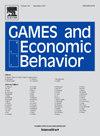与私人信息讨价还价的立法:多数同意和一致同意规则的比较
IF 1
3区 经济学
Q3 ECONOMICS
引用次数: 0
摘要
我们研究了一个带有私人信息的三人两期议价博弈中不同投票规则的影响。一个单独的提议者在多数或全体一致的规则下寻求对一项提议的同意。两名回应者私下里都知道分歧的代价。我们描述了阶段无优策略中的贝叶斯均衡。我们的核心结果是,在一致同意规则下,响应者“更昂贵”,因为他们喜欢被视为高类型。除非在非常严格的参数条件下,否则在一致同意规则下更有可能出现低效延迟和分歧。我们的分析为之前非正式陈述的直觉提供了理论基础。此外,它还提供了对潜在动机的更深入的见解,以及它们对与私人信息讨价还价的最佳行为的含义。本文章由计算机程序翻译,如有差异,请以英文原文为准。
Legislative bargaining with private information: A comparison of majority and unanimity rule
We investigate the effects of alternative voting rules in a three-person, two-period bargaining game with private information. A single proposer is seeking to secure agreement to a proposal under either majority or unanimity rule. Two responders have privately known disagreement payoffs. We characterize Bayesian equilibria in stagewise undominated strategies. Our central result is that responders are ‘more expensive’ under unanimity rule because they like to be perceived as high types. Inefficient delay and disagreement are more likely under unanimity rule, except under very restrictive parameter conditions. Our analysis provides a theoretical foundation for intuitions that have been stated informally before. In addition, it yields deeper insights into the underlying incentives and what they imply for optimal behavior in bargaining with private information.
求助全文
通过发布文献求助,成功后即可免费获取论文全文。
去求助
来源期刊

Games and Economic Behavior
ECONOMICS-
CiteScore
1.90
自引率
9.10%
发文量
148
期刊介绍:
Games and Economic Behavior facilitates cross-fertilization between theories and applications of game theoretic reasoning. It consistently attracts the best quality and most creative papers in interdisciplinary studies within the social, biological, and mathematical sciences. Most readers recognize it as the leading journal in game theory. Research Areas Include: • Game theory • Economics • Political science • Biology • Computer science • Mathematics • Psychology
 求助内容:
求助内容: 应助结果提醒方式:
应助结果提醒方式:


